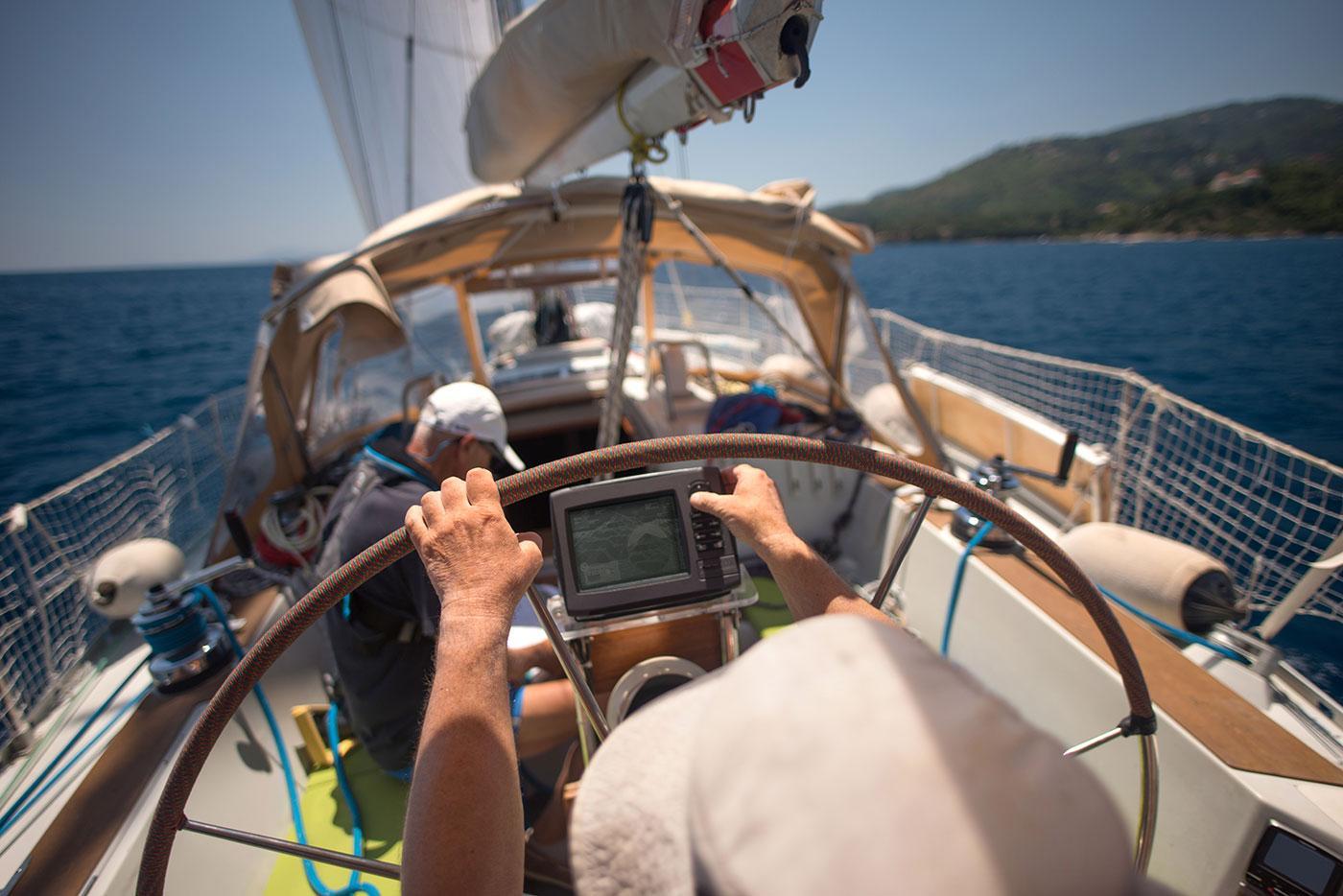
Where to study sailing. The guide to yachting schools and licenses
The audience of fans of sailing is constantly expanding. Basically, it is growing because of those who choose yachting as an active holiday, and do not seek for a sports or professional career. After two or three cruises on a charter boat with a hired skipper you logically begin to desire to stand abaft the wheel on your own. And here comes the question: Where to go to study? In this article, we will consider what schools exist and how to choose between them.
Reasons to learn sailing. Why get a yachting license
The first thing you need to decide for yourself is why you need a sailing license: only for leisure or for work too. Besides, you need to decide on the navigation region, the distance of the proposed routes from the coast, whether you want to manage your own sailboat and sailing plans for several years ahead.
Why it is important to understand your goal before choosing a school? There are two main reasons:
- There is a big difference between sailing in the Mediterranean and, for example, the Transatlantic crossing. These are completely different levels of licenses.
- The requirements for the skipper on the part of the authorities and the charter company will depend on the host country. The owner of his own yacht under the national flag is always in a better position than the person who rents a sailboat. It is related to the variety of types of licenses and the lack of a single global legal framework.
Types of sailing schools and licences. How to learn yachting
Let's try to deal with the most common types of documents confirming the right to sail a yacht. There are five main ones:

Types of sailing schools and licences. Valerya Milovanova / Windy.app
National license if you are a yacht owner
If you are traveling in your own boat, then, as in the case of a car, for most countries there will be enough a national license. So, for US residents all the information about obtaining certificates of competence to a sailing yacht can be found at Ussailing.org. Depending on the state, the document may vary or be inexistent at all.
The UK does not require its citizens any documents to navigate a yacht up to 24 meters in length, but to go beyond the territorial waters, it offers to receive an International Certificate of Competence (ICC) which is authorized to issue by the Royal Yachting Association (RYA). We will talk about it below. Or, for example, in Greece such issues are managed by the Ministry of Shipping and Island Policy.
ICC for some European countries
If car drivers have the Vienna Convention on Road Traffic of 1968, then yachtsmen have resolution No. 40 of the United Nations Economic Commission for Europe (UNECE) of 1998. The resolution establishes an international certificate for the right to sail pleasure boats — ICC.
But even within the European Union, this document is not recognized everywhere so that by itself it has a very modest value. Today ICC is accepted in more than 20 countries including Great Britain, Netherlands, Norway, Finland, Croatia, South Africa, and others.
Since 2019 the port authorities of Greece have also begun to pay attention to the availability of this license.
RYA for professionals in the yachting industry
If you need not only a document that is used almost everywhere in the world, but also real knowledge, supported by experience, you should contact a school that has RYA accreditation. Until recently, only British subjects could manage such institutions.The main agency in the harshest possible way takes care of the level of trainers, the observance of training programs and the quality of examinations. English is the language of instruction, just as the language of negotiations on the float.
Currently, RYA offers 79 different programs covering almost all areas of activity on the water. It is important to understand: paying for school fees doesn’t guarantee that you will receive the precious license. To do this, you have to study hard and be well-prepared for all verification tests.
IYT for self-charter
The second most popular sailing school system is Canadian International Yacht Training (IYT). There are no such severities as in RYA. The school can teach in any language, and control by headquarters is very conditional. Thanks to this, the system has spread widely in the countries of Eastern Europe.
Many training centers and even individual instructors can absolutely legally issue you this kind of document. Naturally, the percentage of those who passed the examination for driving license at the first try is much higher here. Nevertheless, many charter companies are ready to permit boats to skippers with such a license.
Private and non-certified programs for beginners and those who do not want to go far from home
In addition, there are many other academic associations, but their documents are recognized, at best, only by several friendly rental companies. There are also those who have RYA or IYT accreditations, but at the same time, they offer their own non-certified programs. First of all, they are intended for those who are just begin sailing. Here the main task of students is to gain basic practical experience, study up on terminology, but without overpaying for a licensed course.
It is possible to get such a base on any reservoir, while for full training you will have to go to the sea. In fact, all further training, except for the very basics, is tied exactly to the sea crossings and nautical miles. In fact, all further training, except for the very basics, is tied exactly to the sea passages and nautical miles building.

Shutterstock
Types of yachting programs. How much time and money is needed to learn sailing
Yachting school training programs are a logical extension of the licenses needed to operate a yacht and sail it on the seas. But they can all be divided into four types: for beginners, advanced amateurs and professionals who want to improve their skills or get a new license. There is a separate category for those who are going to cross the Atlantic Ocean. Let us also focus on RYA and IYT as the main ones.
Sailing school programs for newbies
The minimum level of competency that both schools offer is Competent Crew. The program RYA Competent Crew (RYA CC) is designed for those who are tired of being passengers and want to get the basics of sailing the yacht. In case you have never been on board, there is an introductory online course called “Start Yachting”, but you can easily replace it by reading the book “Sailing for Dummies”. After having the RYA-course, you will understand the terminology, learn how to knit basic knots, be able to work with sails and provide expert assistance in mooring. The most important thing is that this certificate gives you the right to be on duty and turns you into a qualified expert, whose presence on board may be critical for some charter companies.
IYT offers beginners the Day Skipper / Crew Sail program. In contrast to the Competent Crew, the holder of this certificate gets the right to sail a yacht up to 10 meters during the daytime on inland waterways, with a distance of no more than 5 miles from the coast and of course in good weather.
Sailing school programs for upper and advanced level
RYA Day Skipper or International Bareboat Skipper programs from IYT includes theory and practice. The theoretical part can be learned in the same school where you will take a practical exam, or you can prepare yourself, including online or choose courses near the house, where you will be trained to pass a theory test, but without overpaying for tuition at a certified center.
RYA and IYT programs are almost identical. They train coastal captains with the only difference that the RYA Day Skipper requires only 100 covered nautical miles.
Both programs limit the navigation area to the 20-mile zone in tidal waters, and the time of exit - by daylight hours. In the case of RYA, you can remove the time limit by completing the additional Coastal Skipper (RYA CS) course, but for this, you will need to build another 300 nautical miles and spend at least 15 days to train.
An RYA Yachtmaster Coastal certificate will give you full skills set. Having it you will be able to be a crew on commercial yachts, in fact becoming a full-fledged captain. But only coastal navigation. The estimated cost of the RYA Day Skipper is 1100 pounds, the additional RYA Coastal Skipper course is 700 pounds and the RYA Yachtmaster Coastal certificate is 2000 pounds.
The IYT program will take 10 days to study and will require at least 200 nautical miles. And receiving an ICC certificate for an additional payment, you will be also allowed to sail in the dark. IYT also has the Yachtmaster Coastal program, which expands the coastal navigation zone to 60 miles, but does not give the right to work as a skipper. Such a license will cost about 1,100 euros, and the additional ICC certificate is another 150 euros.
Sailing school programs for pros
If you want not to limit yourself to coastal areas and to participate in offshore races, such as the Rolex Middle Sea Race, for example, you will need a Yachtmaster Offshore certificate. The name of the course is identical in both schools. You have to work really hard to get this license: the asset must have at least 2,000 covering nautical miles, long crossings as a captain and serious bundle of knowledge. The price is roughly comparable: RYA — 2500 pounds, IYT — 2500 euros.
Sailing school program for those who are going across the Atlantic
For those who conceive an idea to cross the Atlantic or around Cape Horn regularly, the highest level is intended: Yachtmaster Ocean. To obtain it, you must have a practice of at least ten years, including non-stop crossings at least 600 covering nautical miles. So, for beginners, Yachtmaster Ocean can only serve as a long guide marks to the future.

Shutterstock
Content of the sailing training program. What does yacht training include
Before studying you should learn the details of the selected course. Regardless of the school, it is guaranteed to include certain positions. For daytime coastal navigation this is:
- a theoretical and practical course in navigation,
- the construction of the yacht,
- preparation of the yacht for sailing,
- practicing of emergency situations, including "Man overboard",
- navigating the yacht under the motor and under sail,
- tips for anchoring and mooring.
In addition, it may be necessary to complete a practical course of using Marine VHF DSC radios and a course of first aid. In fact, before you go to sea, you have to pass the theory, as in obtaining the driving license. Those who do not pass — are not allowed to sail. Naturally, self-preparation plus the minimum experience gained at any local yacht club can play a big role.
Kids yachting education
All mentioned programs are available for those who are already 18 years old. But this does not mean that yachting is not for children. On the contrary. Already from the age of six, you can send a child to the sailing section, where he/she will not only comprehend the theoretical base, but also receive invaluable competitive experience. If you want to make a right choice, you should look at the number of regatta awards received by its pupils over the past five years.
The first step in most sailing schools is still the dinghy "Optimist": an international class that is perfectly suited for elementary education. At the same time, there are very large-scale competitions right up to the world championship. It will be already clear at this stage what the potential of the young yachtsman is. And if he can express himself, then the direct way goes further into the Olympic classes, where in addition to good tactical thinking and the sense of the wind that has been developed at the "Optimist", he will need serious physical training.
In the event that he does not like the Olympic sport, nothing can prevent from going to the non-Olympic classes. The skill of sailing can perfectly support both pleasant leisure on the float, and participation in amateur regattas, where the intensity of emotions is not lower than in professional sports. A huge number of different classes around the world ensures that you can easily find a sailboat on which you can sail and float with your child.
Useful books for yachtsman
An alternative to the study of theory in the classroom and to consolidate the basic knowledge is to get acquainted with the specialized literature. To prepare it is optimally to read the RYA or IYT study guides. At the same time, "The Handbook of Sailing: A Complete Guide to All Sailing Techniques and Procedures for the Beginner and the Experienced Sailor" by Bob Bond remains an ageless classic. It is worth to pay attention to the work "Complete Sailing Manual" by Steve Sleight. For those who want to thoroughly understand the work of the sails and rigging, the book by Bill Gladstone "Sail Trim and Rig Tuning: A Captain's Quick Guide (Captain's Quick Guides)" is suitable. But the main advice: do not forget to combine theory with practice. And then yachting will give you a maximum of positive emotions!

Shutterstock
The most popular schools among beginner yachtmen. Where to learn sailing
Of course, the best schools for learning yachting are those located in maritime countries with a rich yachting history and where the path from school desk to port and out to sea is as short as possible. Let's take the Mediterranean Sea as an example: here the main yachting schools are located in Greece, Montenegro and Croatia. Here is a small list of specific schools:
Sailing schools in Greece
- Aegean Sailing School Accredited by RYA
- Thessalia School of Sailing Accredited by RYA
- Kalamaki Sailing School Accredited by IYT
- Athens Sailing School Accredited by IYT
Sailing schools in Montenegro
- Porto Montenegro Yacht Club Accredited by RYA
- Yacht School "7 winds" Accredited by IYT
- Sail Band Sailing School Accredited by IYT
Sailing schools in Croatia
- Yacht Sail Training Accredited by RYA
- Activity Yachting Accredited by IYT
- Adriatic Sailing Academy Accredited by IYT
As some sort of conclusion: both RYA and YIT have many fans around the world. Disputes about which sail training system is better do not die down for a minute. My advice: if your goal is coastal navigation, pay attention to the combination of the International Bareboat Skipper from IYT and the International Certificate of Competence. As for the more advanced levels, look at the programs from RYA.
Regardless of your license, gain as much practice as possible. If you wish, you can always take part in a sailboat transfer as a crew and build nautical miles or little by little to gain experience in regular small voyages. Find a certified center near you at the following links: RYA, IYT.
This post was originally published on the Windy.app blog on July 15, 2019.
Text: Windy.app team
Cover photo: Shuttestock
You will also find useful
Types and purposes of yachting boats
Validity of yacht licenses in various countries of the world
How to get first-time skipper experience